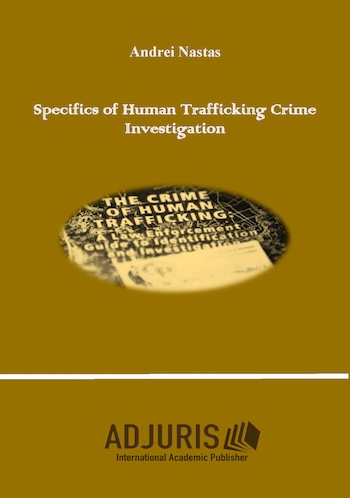Specifics of Human Trafficking Crime Investigation
Specifics of Human Trafficking Crime Investigation
Author(s): Andrei Nastas
Subject(s): Economy, Law, Constitution, Jurisprudence, Criminal Law
Published by: ADJURIS – International Academic Publisher
Keywords: Human Trafficking Trends; International Regulations; ECHR Standards; Forensic Investigations; Criminal Proceedings; Special Investigative Techniques; Victim Assistance; Financial Investigations;
Summary/Abstract: Topicality of the researched topic. Trafficking in human beings can be considered a multidimensional crime and an illegal business, which can undermine the rule of law and create instability. As a global phenomenon, it is considered a modern or contemporary form of slavery, which has profound social and economic implications, affecting on the one hand, the security of the state, and on the other, fundamental human rights and the dignity of the victim. For this reason it is called a form of inhumane trade, which in turn can be present in any country. Trafficking in human beings is a crime that destroys lives, violates the dignity, freedom and fundamental rights of the victims. It is often a violent crime committed by organised criminal networks, which should not exist in today's society. However, human trafficking is a global phenomenon. It exists in every country, in every region and it still exists in the EU. According to the most recent data available, there were more than 14,000 registered victims in the EU in 2017-2018. The actual number of victims is probably much higher, as many remain unidentified. This crime brings high profits to criminals and generates enormous hu-man, social and economic costs. In 2015 worldwide, the estimated annual profit from human trafficking was €29.4 billion and, in the EU, the economic cost in a single year is estimated at €2.7 billion. Trafficking in human beings is closely linked to organised crime as a branch of organised crime. It should also be seen as one of the problems of mi-gration, as this phenomenon can be interpreted as an extreme manifestation of the violation of migrants' rights, and the legal status of the foreign migrant in the destination country directly affects his/her vulnerability to exploitation. This phenomenon cannot be static and is constantly changing. Over time, new elements of trafficking in human beings have emerged, while others are los-ing their significance. In its evolution, trafficking in human beings has been trans-formed in such a way that the role of recruitment has diminished and the role of exploitation of victims has increased, the increased application of information and communication technologies at all its stages, the increased role of private agencies in recruiting victims, the methods of influencing victims, manifested by the diminishing application of physical violence and the increase in psychological manipulation, and the evolution of the COVID-19 pandemic, which has also fa-voured the development of this phenomenon. In view of the above-mentioned circumstances, the phenomenon of traf-ficking in human beings is an act of increased interest to society and, in order to combat it, the law enforcement agencies have a major role to play, having the primary task in the criminal and financial investigation of these crimes, assistance and protection of victims of trafficking in human beings, as well as confiscation of the proceeds of crime.
- Print-ISBN-13: 978-606-95862-4-2
- Page Count: 105
- Publication Year: 2024
- Language: English
- eBook-PDF
- Table of Content

